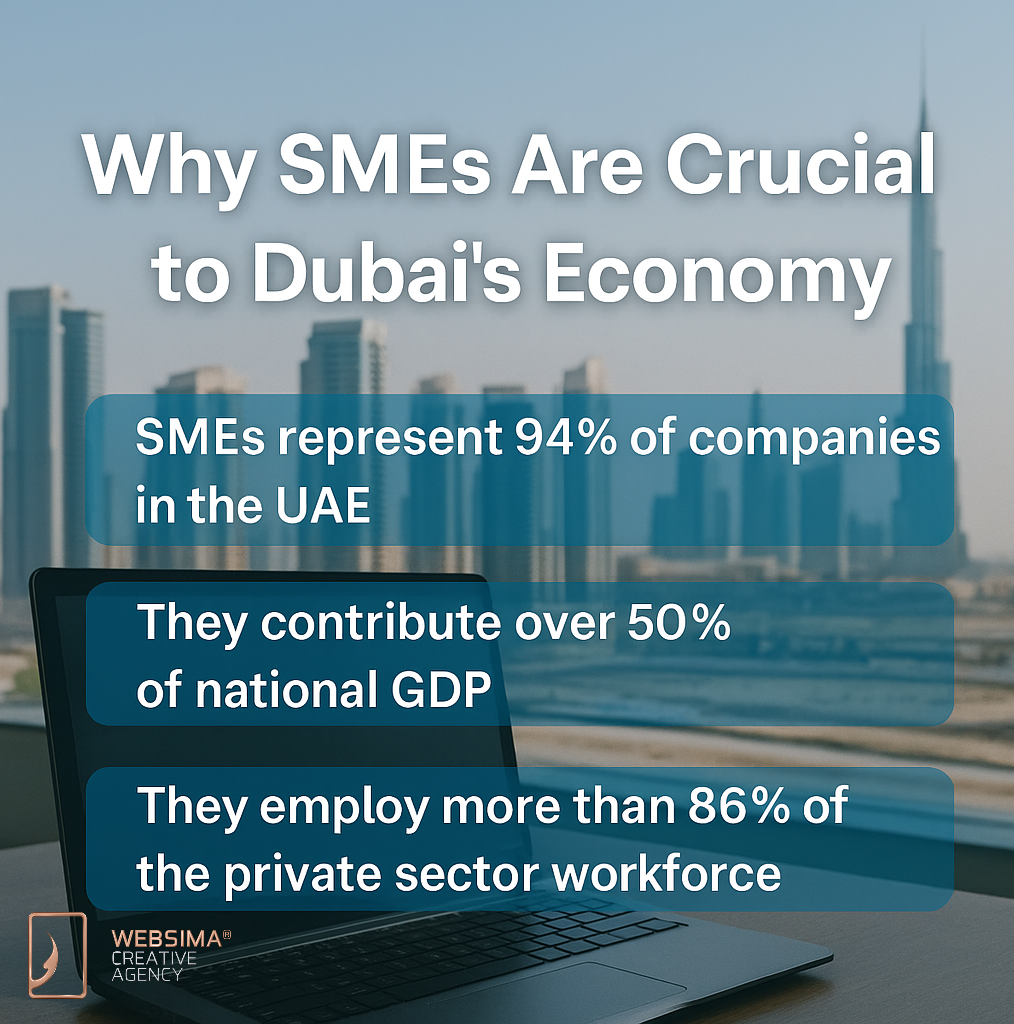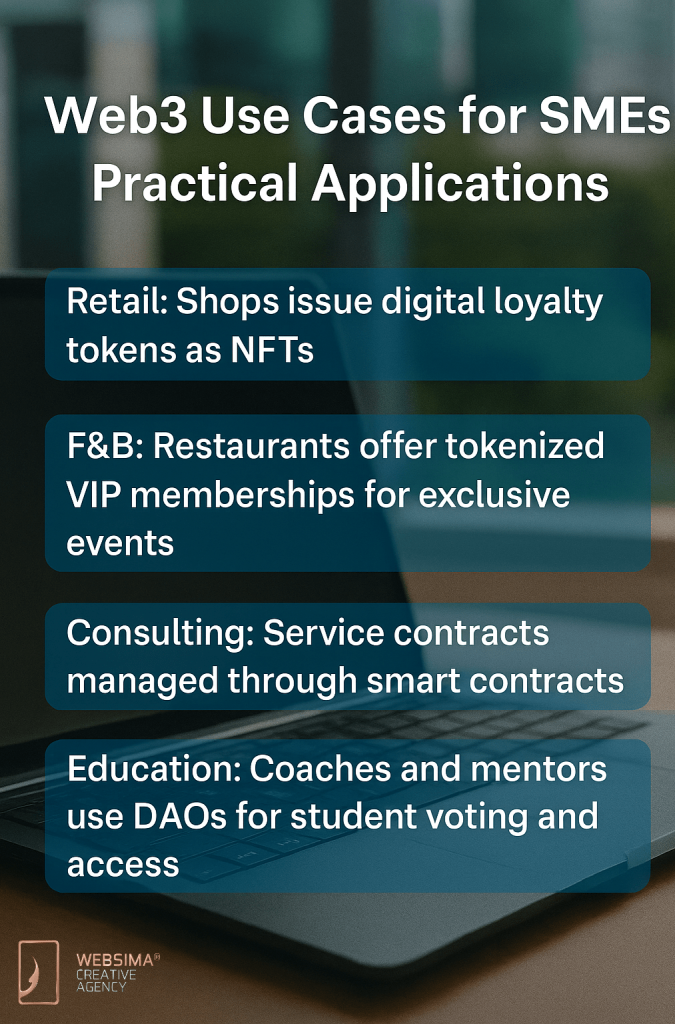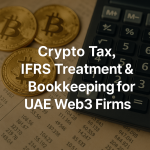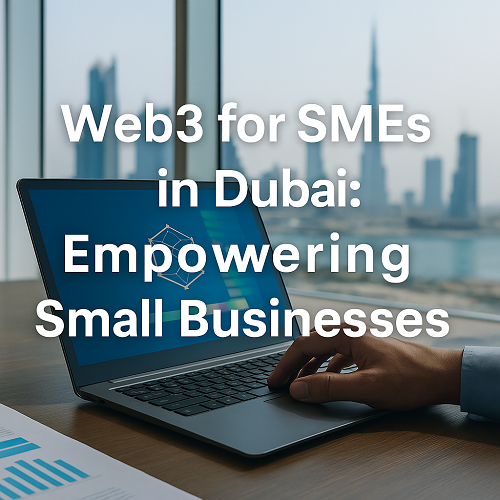Table of Contents
- Introduction: A New Era for Dubai’s SMEs
- Why SMEs Are Crucial to Dubai’s Economy
- What Is Web3 and How Is It Different?
- Benefits of Web3 for SMEs in Dubai
- Web3 Use Cases for SMEs: Practical Applications
- Key Technologies Powering Web3 for SMEs
- Tokenization: Making Assets Liquid for Small Businesses
- Smart Contracts and Automation for Operational Efficiency
- Decentralized Finance (DeFi) and Access to Capital
- Challenges to Web3 Adoption for SMEs
- Government Support and Regulatory Considerations
- Global and Local Case Studies
- Steps for Dubai SMEs to Begin Their Web3 Journey
- Conclusion: The Future of Business Is Decentralized
- FAQs
- Launch Your Web3 SME Strategy with Websima
Introduction: A New Era for Dubai’s SMEs
Dubai’s small and medium-sized enterprises (SMEs) are entering a new era of digitization and global competitiveness. As the emirate accelerates its transformation into a blockchain-powered smart economy, Web3 is redefining how SMEs operate, grow, and compete.
From tokenizing assets to automating business contracts through smart contracts, and raising capital through decentralized finance (DeFi), Web3 programming for developers in UAE can provide Dubai’s SMEs with tools that were previously out of reach in traditional business models.
There’s a free web3 coworking spaces here in Dubai.
Free unlimited entry, free food, and free podcast room access.
All in a prime location of Dubai Marina.
Genuinely curious, what’s the business model here? How is this sustainable. pic.twitter.com/ylFvuRU9lG
— Leon Abboud (@leonabboud_) September 27, 2024
Welcome to Web3 for SMEs in Dubai—where transparency, automation, and ownership converge.
Why SMEs Are Crucial to Dubai’s Economy

Dubai’s vibrant SME sector plays a central role in the UAE economy:
- SMEs represent 94% of companies in the UAE
- They contribute over 50% of national GDP
- They employ more than 86% of the private sector workforce
Yet despite their significance, many SMEs face barriers such as limited access to capital, high operational costs, and bureaucratic inefficiencies.
Web3 technologies can address these challenges by decentralizing access, reducing friction, and creating peer-to-peer trust systems.
What Is Web3 and How Is It Different?
Web3 is the next evolution of the internet, powered by blockchain, cryptographic protocols, and decentralized applications (dApps).
Where Web2 depends on centralized platforms (Google, Meta, banks), Web3 enables users and businesses to interact directly—without intermediaries.
Key Web3 pillars include:
- Decentralization: Power is distributed, not concentrated
- Trustless systems: Verified by code, not institutions
- Token-based economics: Value is transferred via crypto assets and NFTs
- Ownership: SMEs own their data, infrastructure, and customer engagement layers
- Automation: Processes are handled by smart contracts
This shift empowers SMEs to control their digital destiny while reducing reliance on high-cost middlemen. However, it is essential for Web3 developers to know how to build trust in Web3 projects in Dubai and UAE.
Benefits of Web3 for SMEs in Dubai
✅ Lower Costs
Smart contracts and direct payments reduce banking fees, legal costs, and third-party dependencies.
✅ Global Fundraising
DeFi platforms and tokenized offerings let SMEs raise capital across borders—without legacy banks or VC gatekeepers.
✅ Full Transparency
Blockchain’s immutable ledger builds trust with customers and partners, reducing fraud and misreporting.
✅ Operational Automation
Web3 lets SMEs automate payroll, invoicing, royalties, subscriptions, and inventory updates.
✅ New Revenue Models
NFTs and token economies open doors for loyalty programs, community incentives, and digital product monetization.
Web3 Use Cases for SMEs: Practical Applications

Dubai’s SMEs across sectors are already adopting Web3:
- Retail: Shops issue digital loyalty tokens as NFTs
- F&B: Restaurants offer tokenized VIP memberships for exclusive events
- Consulting: Service contracts managed through smart contracts
- Education: Coaches and mentors use DAOs for student voting and access
- E-commerce: Web3 storefronts accept stablecoins and launch NFT collectibles
These use cases demonstrate how Web3 aligns with the lean, flexible nature of small businesses, helping them scale faster and serve global customers.
Key Technologies Powering Web3 for SMEs
| Web3 Technology | Application |
| Blockchain | Records transactions immutably and transparently |
| Smart Contracts | Automate agreements, payments, and workflows |
| NFTs | Tokenize digital goods, memberships, and brand loyalty |
| DAOs | Enable community governance and resource pooling |
| DeFi Protocols | Offer decentralized lending and crowdfunding |
| Decentralized Storage (e.g. IPFS) | Securely host documents and digital products |
Dubai SMEs can plug into these ecosystems using platforms like Polygon, Arbitrum, or BNB Chain with low fees and global compatibility.
Tokenization: Making Assets Liquid for Small Businesses
Tokenization allows SMEs to convert real or intangible assets into digital tokens on the blockchain. These can represent:
- Inventory
- Equipment
- Real estate
- Licenses
- Future earnings or royalties
These tokens can be fractionally sold to investors or community members, offering liquidity and access to capital.
Example: A Dubai-based fitness studio can tokenize prepaid membership packages and sell them to supporters, creating a cash flow buffer without debt.
Smart Contracts and Automation for Operational Efficiency
Smart contracts allow SMEs to:
- Automate payments based on delivery
- Handle milestone-based project agreements
- Simplify payroll and HR onboarding
- Control supplier agreements
- Eliminate invoice delays
For example, a Web3-savvy logistics firm in Dubai can use smart contracts to auto-pay drivers when deliveries are validated via GPS and timestamp—no admin needed.
Decentralized Finance (DeFi) and Access to Capital
Traditional financing often excludes early-stage SMEs due to collateral or paperwork. DeFi offers a different path.
Via DeFi, SMEs can:
- Access instant lending pools backed by smart contracts
- Use crypto collateral instead of physical assets
- Launch community liquidity rounds
- Stake treasury funds for passive yield
- Raise capital via token offerings (IDOs or NFTs)
Some global DeFi protocols like Aave, Compound, and Balancer are already being explored by Dubai-based blockchain startups.
Locally, the DMCC Crypto Centre and DIFC Innovation Hub support projects building compliant DeFi tools for regional use.
Challenges to Web3 Adoption for SMEs
Despite the opportunities, Web3 adoption faces friction:
- Regulatory ambiguity on tokens and asset classifications
- Technical complexity and developer shortages
- Cybersecurity and wallet risks
- Low public awareness and digital literacy gaps
- Volatility in crypto-based fundraising
SMEs should work with local blockchain consultants, start small, and ensure their solutions align with VARA and DFSA guidelines.
Government Support and Regulatory Considerations
Dubai’s government is Web3-forward, offering unmatched infrastructure:
- VARA (Virtual Assets Regulatory Authority) governs crypto, NFTs, and token activities in Dubai
- DMCC Crypto Centre provides licensing and incubators for Web3 businesses
- DIFC Innovation Hub supports fintech and Web3 projects
- Dubai Future Foundation offers R&D for blockchain and AI integration
- Regulatory sandboxes allow SMEs to test projects in controlled environments
The regulatory framework is evolving, but Dubai leads the region in pro-Web3 policies.
Global and Local Case Studies
FlickPlay (USA)
An app combining location-based games with NFT-powered rewards—ideal for SMEs in retail and tourism.
Tokn Agency (UAE)
Helps businesses launch NFT-based access passes, loyalty schemes, and brand collectibles.
Sheesha Finance (UAE)
Supports startups with token-based capital raising, DeFi structuring, and ecosystem advisory.
These show how SMEs are no longer excluded from the blockchain economy—they’re helping define it.
Steps for Dubai SMEs to Begin Their Web3 Journey
- Identify business friction points (payments, funding, loyalty, etc.)
- Choose a blockchain platform that suits your needs
- Design token or NFT utility with value-driven incentives
- Develop and audit smart contracts with a trusted developer
- Set up legal compliance with guidance from local authorities
- Launch with pilot programs or closed communities
- Measure adoption and scale via feedback loops
Starting small and growing iteratively is the Web3 way.
Conclusion: The Future of Business Is Decentralized
Web3 for SMEs in Dubai is more than a trend—it’s an inflection point. With the tools to automate, fund, and expand businesses globally, SMEs no longer need to rely on legacy systems.
Dubai’s regulatory clarity, blockchain infrastructure, and entrepreneurial energy make it the ideal launchpad for decentralized business models.
From neighborhood cafes to digital agencies and e-commerce shops, SMEs in Dubai are ready to lead the Web3 charge.
FAQs
Can I launch a token as a small business in Dubai?
Yes, but it must follow VARA’s framework for utility, governance, or security tokens.
Do I need a blockchain license to accept crypto payments?
Depending on your activities, yes. Accepting crypto payments may require approval from VARA or DFSA.
How do I find a Web3 developer in Dubai?
Work with firms licensed by DMCC or DIFC Innovation Hub, or consult Websima’s smart contract development team.
Is Web3 relevant to non-tech SMEs?
Absolutely. Retail, fitness, food, logistics, and consulting businesses can all use Web3 tools.
What risks should I watch out for?
Token volatility, regulatory compliance, security vulnerabilities, and improper contract coding.
Launch Your Web3 SME Strategy with Websima
At Websima, we specialize in helping Dubai’s SMEs transform into Web3-ready businesses. From developing secure smart contracts to building user-friendly dApps and token models, our team ensures you launch safely, strategically, and successfully.
We offer:
- Custom blockchain architecture
- Smart contract development and audit
- Tokenomics consulting and deployment
- Full-stack Web3 website and dashboard design
- Legal and compliance support tailored to UAE laws
Want to launch your SME into the decentralized future?
Contact Websima now and let our experts help you build, secure, and scale your Web3-powered business in Dubai.





